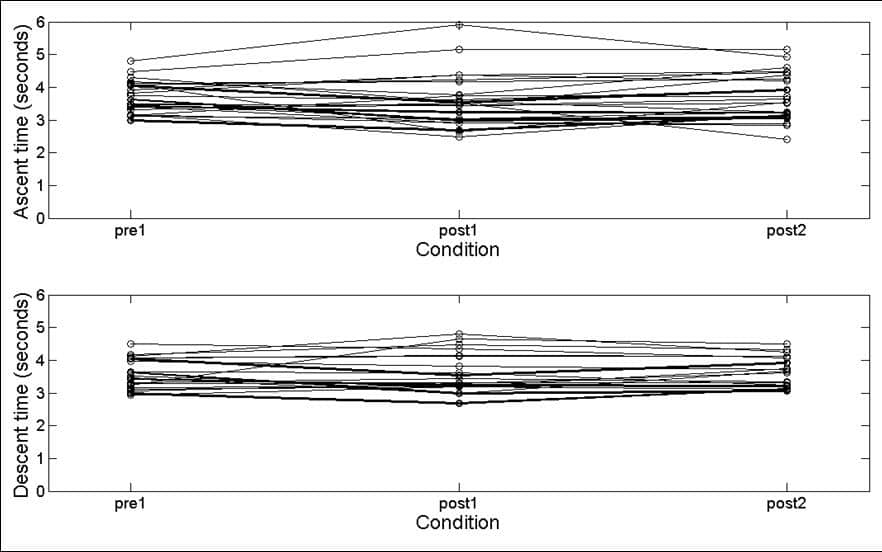In terms of self-rated health, the most important activities of daily living are those involving mobility, such as stair climbing (1). A loss of stair climbing ability with age is normally associated with a loss of muscle strength and power. Despite the fact that muscle power and strength are important factors in functional activities, other factors that affect muscle function, such as fatigue, are often not taken into account when activities of daily living are assessed. The effect of Low Frequency Fatigue (LFF) on activities of daily living has not yet been researched, while it has been repeatedly proven in laboratory settings that it significantly influences the force production (2). LFF is caused by near maximal activation, is seen afterwards with voluntarily or electrically stimulated muscles at low frequencies (up to 20 Hz) and recovery takes hours or even days. This study explores if LFF alters stair climbing performance in twenty healthy adults. LFF was defined as the ratio between the muscle moments generated by electrical stimulation at 15 and 100 Hz. An intense concentric and eccentric exercise protocol was used to induce fatigue. Stair climbing performance, described by stair ascent and descent times, was measured before and after the exercise. The exercise routine induced long lasting fatigue with only a moderate recovery in the subsequent time period (ratio of 0.08±0.03 vs 0.15±0.03 before exercise, mean ± SD), but did not seem to have any influence on stair climbing performance. The times it took to ascend and descend the stairs did not change (p>0.2) when fatigue increased (figure 1). The motor system seems to be more then able to cope with the decreased force response to low frequencies. The ease, at which the system is able to compensate for fatigue, might be a necessity as LFF is phenomenon that could occur on a daily basis. How well the system copes with LFF once compensatory mechanisms are declining, due to for example frailty or disease, needs to be further explored.
University of Manchester (2010) Proc Physiol Soc 19, PC165
Poster Communications: The Effect of Low Frequency Fatigue on Stair Climbing Performance
J. H. Bergmann1, I. H. Smith1
1. Applied biomedical research, King's College London, London, United Kingdom.
View other abstracts by:
Figure 1. Stair ascent and descent times obtained for each subject. Pre1 contains stair climbing times taken before the fatiguing exercise, while post1 and post2 were acquired approximately 15 and 30 minutes after the exercise.
Where applicable, experiments conform with Society ethical requirements.

